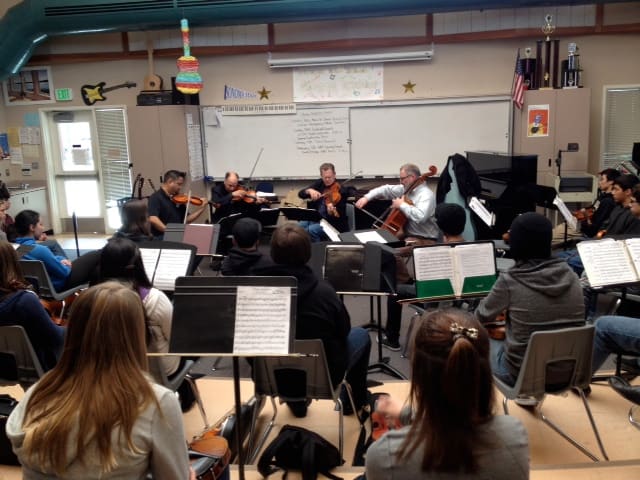San Francisco Performances is celebrating National Arts in Education this week by featuring the work of their resident artists as well as their in-school education programs through their San Francisco Performances Arts Education Programs. To help in the celebrations, they’ve asked ASQ’s Sandy Wilson the following question:
What influenced or inspired you to become an educator?
As a pre-schooler in northern England, I was taken by my parents who taught geography and science, to see every concert, play and show that was performed by their high-school students. As a 6 year old kid, I distinctly remember hearing a performance of Faure’s Siciliène by a probably 10th grade cellist. My vivid impression has lasted all these 50+ years, – specifically that the range and sonority of the instrument seemed irresistible, but the physics were all wrong – that was NOT the right way to play it!
I guess we learn in the most individual of ways… I was probably precocious and certainly a little overconfident, but a couple of years later when I was asked if I’d like to learn to play the violin, I already knew that it was only the cello that interested me. I was incredibly fortunate in identifying what for me was the right instrument for me at first try. I was even more lucky to be introduced to a sequence of outstanding teachers over a few years who generously enabled me to make swift, almost unfaltering progress, right off the starting line. I was a fast learner and was exceptionally well taught.
What has stuck with me over my entire career is that when it’s right and well timed, great instruction combined with good students are an unstoppable force. What is perhaps even more universal however is that the power of good music and art in general is undeniable and it must absolutely never be diluted into age-appropriate portions. Simply excellent follow-through is critical if it’s going to “take.” I believe that even the very youngest of kids infallibly recognize and are typically inspired by great quality, even when they’re unfamiliar with the genre. They need the very best available stuff and in concentrated doses. They are merely naturally suspicious when they’re dispensed with diluted, modified (and frequently sub-standard) ersatz “classroom appropriate” substitutes.
What has proven one of the most consistently generous and inspired “gifts” to the ASQ during our almost two and a half decades in the Bay Area, has been our enduring affiliation with San Francisco Performances. SFP’s landmark Arts Education Programs are simply legendary and a model that our entire country has aspired to emulate in various impressive and demonstrably successful community outreach programs. Over the 24 years that we have been resident and active in this community, we have been able to get the Alexander String Quartet into high school Social Studies classrooms, into Applied Music labs – (including Orchestral, Chamber, Solo and Choral), into Mathematics classrooms, ESL labs and many, many more. Most importantly, the ASQ have been afforded, thanks to SFP, the opportunity to sow some of the seeds of possibility into the fertile learning-brains of young and frequently, statistically disadvantaged young, but certainly potentially future patrons and even practitioners of the arts. Is this not Civics 101?
The Quartet’s affiliation with San Francisco Performances constitutes perhaps one of my most fulfilling activities as an educator. Although I am fully engaged and committed as a teacher of cello and chamber music as Director of the Morrison Chamber Music Center at SFSU’s Instructional Program, engaging daily with established, frequently very gifted and always motivated students, it is the “first impressions” opportunities and exposure that still light me up. Long live San Francisco Performances Arts Education Programs. Thank you Ruth and the wonderful people at SFP, your committed Board and all of those wonderful supporters who make this invaluable mission of the ASQ’s possible. We are playing for our future civilization and it’s critical work. The arts are not extra – they’re essential!

